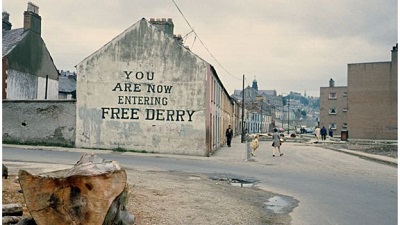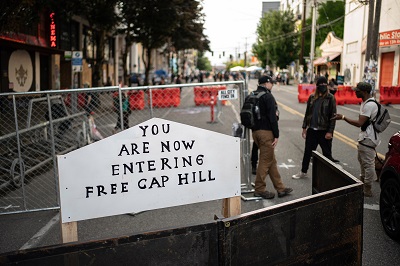We are developing the social individualist meta-context for the future. From the very serious to the extremely frivolous... lets see what is on the mind of the Samizdata people.
Samizdata, derived from Samizdat /n. - a system of clandestine publication of banned literature in the USSR [Russ.,= self-publishing house]
|
In recent times, the common courtesy of trying to avoid wantonly stepping on people’s toes has developed into an editorial phobia of almost psychotic intensity.
This exaggerated concern for the tender toe has, of course, been vociferously encouraged by every sort of hypersensitive minority. The most frantic form of it is displayed by movie producers, who are more sensitive to the tinkle of the cash register than any other species of artistic entrepreneur, and who also know they are catering for a more infantile audience than any other medium other than television.
…Even on the domestic scene, Negroes, Chinese, Jews, Catholics, Baptists or Holy Rollers, can only be depicted as lovable paragons. It has reached the point where the only villain who can be safely used to-day is a white American or British agnostic, preferably named Smith.
– Leslie Charteris, The Second Saint Omnibus, Hodder & Stoughton: London, 1952, p55. No I don’t know what a Holy Roller is either. This volume came into my possession as a result of the Plunder Party on Friday night in which a number of us gathered at the late Brian Micklethwait’s flat to pillage and loot his book and CD collection. Judging by the rather full shelves when I left, libertarians are unlikely to make good Vikings. Mind you, I am told there were some 5,200 books to choose from.
As promised.
By the way, I found this rather good obituary of Brian by Sean Gabb at The Critic.
Update. The post was initially put up with the wrong link (hence Paul’s comment). It has now been corrected.
Brian and I recorded a couple of conversations which remained unpublished at the time of this death. This is the first.
Any comments – which would be gratefully received – are probably best left here on Samizdata.
Interesting and significant (probably) to see Brian’s influence all over the preceding post. My apologies to anyone reading this who didn’t know him and feels left out.
Facts:
- Naomi Wolf is a loony feminist.
- James Delingpole is a heroic leader of the resistance.
- The heroic leader of the resistance has recorded and published a podcast with the loony feminist.
- The loony feminist comes across as sane. I mean really sane. Thoughtful, informed, careful to stick to what she knows and prepared to be honest about what she doesn’t know.
My head hurts. Is this a weird departure from reality? Will the universe will right itself before too long? I hope so, but maybe it isn’t a departure. I am having dark thoughts here, but what if Naomi Wolf has other opinions that are worth listening to? What if other loony feminists have opinions worth listening to? What if some of them are sane? What if a majority are sane? Have I spent a large part of my life being… yernow… wrong?
Nothing official yet but it would appear that there are plans for a European Super League. Yes, I know you’re thinking, “Don’t we already have one of those?” Sort of, except that the Champions League is not a league let alone one of champions. This, on the other hand, would be a proper week-in, week-out competition to determine who – really – is the best team in the world.
Shockingly, some people don’t seem to like it. UEFA doesn’t like it. FIFA doesn’t like it. The British Government – you really would have thought that Boris Johnson would have bigger things on his mind right now – doesn’t like it. Now, I know what you’re thinking, “If *a**e*s like FIFA and the British government are against it, it must be a good thing.” And you know what? you are absolutely right. But there are other reasons to like it. What it means is that ordinary people will be able to watch the best football in the world on a weekly basis. It also means that the footballers who people actually want to watch will get their just rewards. In many ways it is just as revolutionary as the creation of the Premier League in 1993 or the creation of the world’s first league in 1888 or the decision to ban handling and kicking people in the shins. Frankly, it’s about bloody time.
Of course, it is bad news for rubbish teams. But who cares about them? As it happens, I do. I support one of them, well, when they’re not promoting communist thuggery (but that’s another story). But I don’t expect the world to be discombobulated just so I can watch them pulverise the best team on the planet every once in a while. I will still be able to support them – subject to semi-permanent Covid restrictions, of course. They’ll just have to cut their coat to suit their cloth that’s all. Who knows, maybe the competition will stir the game’s organisers to improve it. Perhaps, we’ll see an end to the ridiculous offside rule or sin-bins instead of bookings or even the re-introduction of handling and kicking people in the shins.
- Riots
- Claims of discrimination
- Calls for the police to be abolished
- Involvement of communists
- The media taking the side of the rioters
- The creation of no-go zones for the police
- Calls for the army to be used
- Attempts to appease the rioters
I need hardly remind readers that over the following 30 years some 3,000 people were killed and that even though now the killing has stopped the enmity remains.
  The similarity is intentional.
About half the patients have managed to recover sufficiently to ‘earn’ a tracheostomy and be weaned off the ventilator. The damage to their lungs makes us all wonder if any will avoid being respiratory cripples. Despite this recovery, COVID is also leading to profound neurological dysfunction. Some patients are agitated and confused but for a significant proportion, the lights are on but no one is home. We wonder how families will react to their loved ones being different people.
– Dr Smith at the Adam Smith Institute’s Despatches blog. Smith is an ASI supporter who has gone back to the NHS for the crisis and is reporting from the front line. We are lucky to have a reliable source of information at a time like this.
As you know, despite being right next to China – or perhaps because it is right next to China – Japan is having a good coronavirus outbreak. Despite getting it earlier than Western European countries it has had fewer cases and fewer deaths (349 at time of writing). Why is this? I’d had it down to mask-wearing which as anyone who has ever been to Japan will know is very common.
But I wasn’t quite sure, so when the other night NHK (that’s Japan’s equivalent of the BBC. Think bad, but not that bad) had a documentary on the subject I thought I’d take a look. So, what did they say? The first thing that struck me is that they are bricking it. They – meaning the team that has been set up to study the outbreak – can see this killing a lot of people. They in no sense feel that they have turned a corner. They look enviously at the South Koreans and Singaporeans who had far better testing capacity. That’s not to say they aren’t proud. “I had every faith in the Japanese people.” says one.
Another aspect is the way that Japanese government is formally powerless but informally quite the reverse. There is no legal lockdown in place in Japan because – they say – they don’t have the powers. So why doesn’t the government grant itself those powers like they did in Britain, one wonders? They don’t say. But it would appear that the government “requesting” that people stay away from bars and other crowded places has had the effect of law.
The approach of the study team was – and it may well have changed since the documentary was filmed – to study in detail the outbreaks that occurred. They concluded that the big spreader was the 3 Cs: (En)closed; Crowded; Close Proximity. I must admit that I thought crowded and close proximity meant the same thing. But I guess that crowded refers to the number of people present. One of Japan’s hottest of coronavirus hotspots turned out to be a “Blitish pub” – whatever that may be. I was amused to see that their chief modeller spent time at – you guessed it – Imperial College. So there’s a very good chance that they’re using the same dodgy, secret code that we are. It’s not just viruses that get transmitted from human to human.
What they didn’t do was address why they are doing so well. Considering the size of Tokyo and the scale of commuting there you would have thought it would be far worse. So, I’ll stick with my original hunch. Masks work.
 Masks work. Usually but not always. Two days later I was in hospital.
Here in the UK the week began with shouting at tea and is ending with shouting at permanent secretaries. Home Secretary, Priti Patel is accused of doing the shouting and as a consequence there be ructions. Now this is probably not the time to offer an opinion on whether Patel is guilty of this non-crime, but it does raise the question of whether we should care or not.
Being shouted at is not a lot of fun especially by your boss. All things being equal bosses shouldn’t do it. But bosses are not paid to be nice they are paid to be effective. So, does shouting help? Or hinder? Or not make much difference?
Some examples come to mind:
Churchill. He used to have blazing rows – hours-long blazing rows – with Alanbrooke. But the shouting was both ways. Also – outside 1940 – was Churchill effective? Discuss.
Margaret Thatcher. Despite her fierce reputation rumour has it that she was nice towards her staff. Much the same used to be said about her colleague, Norman Tebbitt, the Chingford Skinhead.
Douglas Haig. Apparently he was very calm. As a subordinate you had to really push it get him angry. But was he effective? I have studied him for years and I am still not sure. Probably yes. Paul Marks, on the other hand, has no such doubts. Definitely not.
In my personal experience, the calmer bosses seem to be more effective but as an employee it’s often difficult to tell.
Frank Falla was a Guernsey journalist when the German occupation began in 1940. He became involved in the production of an underground newspaper and when he was eventually caught he was sent to a German prison (not – please note – a concentration camp). By the time the Americans liberated him he was little more than a bag of bones and close to death. The Americans put him up in a hotel so that he could recover. There he was served breakfast in bed by a German civilian. He writes:
I think her name was Trudi – and she was to spell trouble for some of the American boys. She was a young, attractive brunette who a week later had a pretty rough handling from some soldiers who found out where her bedroom was. Three of them took turns to sleep the night with her. Some of these boys were completely sex-starved after long training in England and fighting their way through France and Germany, and they took it out on this poor girl, who was a week recovering from the ordeal. Still, c’est la guerre!
And all this in an area that was later handed over to the Soviets.
There is a kerfuffle here in the UK over 5G. I can’t in all honesty say that I have the slightest idea what 5G is but I surmise that it is one better than 4G. The issue is around whether the Chinese company, Huawei, should be allowed to supply some of the equipment. Lots of people, including James Delingpole say, “no”. And very few people say, “yes”.
The first question that springs to (my) mind is, what has this got to do with the government? Which I suppose is bound up with the question of what is the threat? Assuming that there is a threat and that government should be “doing something about it”, what is that something?
About the only thing I know about China and telephony is that you should never take your phone to China.
Oh, and one other thing. Guido Fawkes observed that the real scandal is that Chinese technology should prove to be better than western technology. Is this true and is it a portent?
I’ve been rootling around in the Samizdata archives (more of which to come, perhaps) and I found this:
In the bubbled, hypocritical mind of some in Hollywood, the only reason Gervais crossed a line is because he went after them. Had he been as relentless in ripping apart Sarah Palin, her young children, Jesus Christ, or George W. Bush, today the comedian would be celebrated as “edgy” and “courageous” — because only in Hollywood is throwing red meat to a hard-left crowd considered “edgy” and “courageous.” But Gervais didn’t do that. Instead, he trained his satirical fire on Hollywood Power and today there’s serious talk about whether or not the comedian will be brought back to the Golden Globes next year as host.
As you can probably guess from the mentions of Sarah Palin and George W. Bush this is from a while ago – January 19th 2011, to be precise.
Ever got the feeling you’ve been cheated?
|
Who Are We? The Samizdata people are a bunch of sinister and heavily armed globalist illuminati who seek to infect the entire world with the values of personal liberty and several property. Amongst our many crimes is a sense of humour and the intermittent use of British spelling.
We are also a varied group made up of social individualists, classical liberals, whigs, libertarians, extropians, futurists, ‘Porcupines’, Karl Popper fetishists, recovering neo-conservatives, crazed Ayn Rand worshipers, over-caffeinated Virginia Postrel devotees, witty Frédéric Bastiat wannabes, cypherpunks, minarchists, kritarchists and wild-eyed anarcho-capitalists from Britain, North America, Australia and Europe.
|






